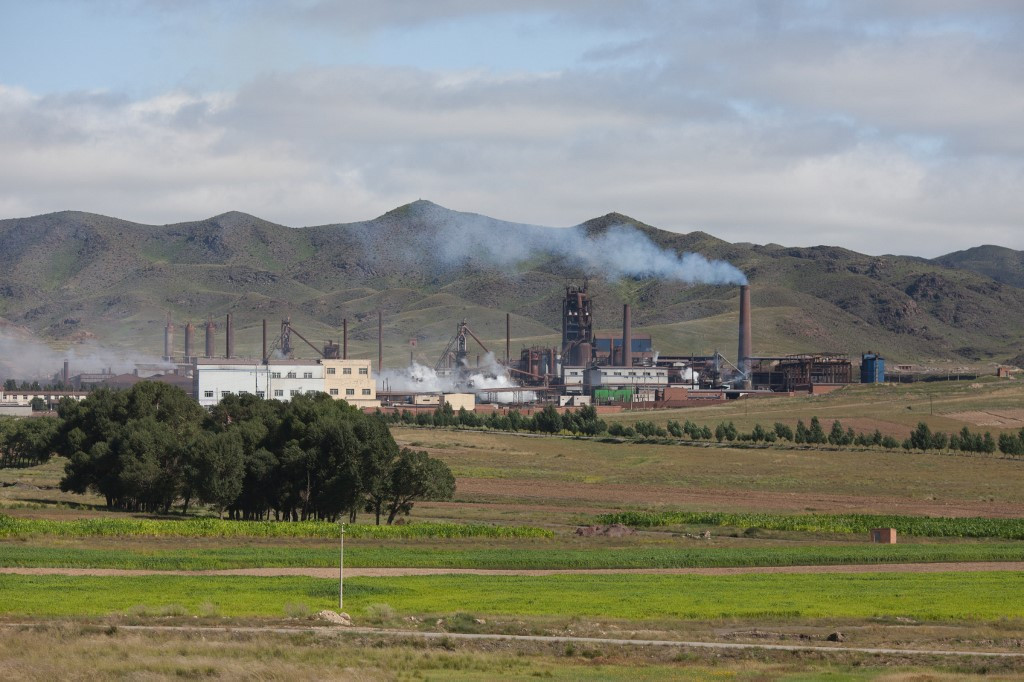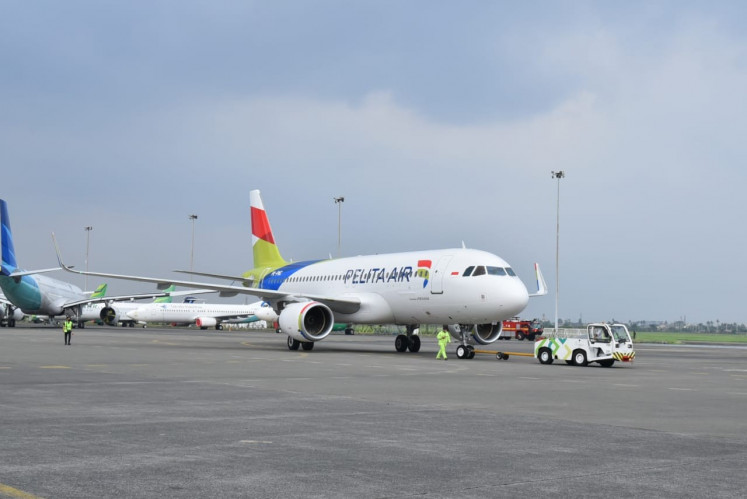Popular Reads
Top Results
Can't find what you're looking for?
View all search resultsPopular Reads
Top Results
Can't find what you're looking for?
View all search resultsGlobal alarm rises as China's critical mineral export curbs take hold
German automakers became the latest to warn that China's export restrictions threaten to shut down production and rattle their local economies, following a similar complaint from an Indian EV maker last week.
Change text size
Gift Premium Articles
to Anyone
 A photo taken on August 20, 2012 shows a general view of a rare earth refinery north of the inner Mongolian city of Baotou. On the edge of the Chinese city of Baotou, a 10-square-kilometer lake is blackened by pollution from factories processing rare earths, elements essential for the production of mobile phones and computers. China produces more than 95 percent of the world's rare earths, 17 elements crucial for making a range of hi-tech products. Two-thirds of that is processed in mineral-rich Baotou on the edge of the Gobi desert. (AFP/Ed Jones)
A photo taken on August 20, 2012 shows a general view of a rare earth refinery north of the inner Mongolian city of Baotou. On the edge of the Chinese city of Baotou, a 10-square-kilometer lake is blackened by pollution from factories processing rare earths, elements essential for the production of mobile phones and computers. China produces more than 95 percent of the world's rare earths, 17 elements crucial for making a range of hi-tech products. Two-thirds of that is processed in mineral-rich Baotou on the edge of the Gobi desert. (AFP/Ed Jones)
A
larm over China's stranglehold on critical minerals grew on Tuesday as global automakers joined their US counterparts to complain that restrictions by China on exports of rare earth alloys, mixtures and magnets could cause production delays and outages without a quick solution.
German automakers became the latest to warn that China's export restrictions threaten to shut down production and rattle their local economies, following a similar complaint from an Indian EV maker last week.
China's decision in April to suspend exports of a wide range of rare earths and related magnets has upended the supply chains central to automakers, aerospace manufacturers, semiconductor companies and military contractors around the world.
The move underscores China's dominance of the critical mineral industry and is seen as leverage by China in its ongoing trade war with US President Donald Trump.
Trump has sought to redefine the trading relationship with the US' top economic rival China by imposing steep tariffs on billions of dollars of imported goods in hopes of narrowing a wide trade deficit and bringing back lost manufacturing.
Trump imposed tariffs as high as 145 percent against China only to scale them back after stock, bond and currency markets revolted over the sweeping nature of the levies. China has responded with its own tariffs and is leveraging its dominance in key supply chains to persuade Trump to back down.
Trump and Chinese President Xi Jinping are expected to talk this week, White House spokeswoman Karoline Leavitt told reporters on Tuesday, and the export curbs are expected to be high on the agenda.
"I can assure you that the administration is actively monitoring China's compliance with the Geneva trade agreement," she said. "Our administration officials continue to be engaged in correspondence with their Chinese counterparts."
Trump has previously signaled that China's slow pace of easing the critical mineral export controls represents a violation of the agreement reached last month in Geneva.
Magnets held up at Chinese ports
Shipments of the magnets, essential for assembling everything from cars and drones to robots and missiles, have been halted at many Chinese ports while license applications make their way through the Chinese regulatory system.
The restrictions have triggered anxiety in corporate boardrooms and nations' capitals - from Tokyo to Washington - as officials scrambled to identify limited alternative options amid fears that production of new automobiles and other items could grind to a halt by summer's end.
"If the situation is not changed quickly, production delays and even production outages can no longer be ruled out," Hildegard Mueller, head of Germany's auto lobby, told Reuters on Tuesday.
Chinese state media reported last week that China was considering relaxing the curbs for European semiconductor firms while the Ministry of Foreign Affairs has said it would strengthen cooperation with other countries over its controls.
However, rare-earth magnet exports from China halved in April as exporters grappled with the opaque licensing scheme.
Frank Fannon, a minerals industry consultant and former US assistant secretary of state for energy resources during Trump’s first term, said the global disruptions are not shocking to those paying attention.
“I don’t think anyone should be surprised how this is playing out. We have a production challenge [in the US] and we need to leverage our whole of government approach to secure resources and ramp up domestic capability as soon as possible. The time horizon to do this was yesterday,” Fannon said.
Diplomats, automakers and other executives from India, Japan and Europe were urgently seeking meetings with Beijing officials to push for faster approval of rare earth magnet exports, sources told Reuters, as shortages threatened to halt global supply chains.
A business delegation from Japan will visit Beijing in early June to meet the Ministry of Commerce over the curbs, and European diplomats from countries with big auto industries have also sought "emergency" meetings with Chinese officials in recent weeks, Reuters reported.
India, where Bajaj Auto warned that any further delays in securing the supply of rare earth magnets from China could "seriously impact" electric vehicle production, is organizing a trip for auto executives in the next two to three weeks.
In May, the head of the trade group representing General Motors, Toyota, Volkswagen, Hyundai and other major automakers raised similar concerns in a letter to the Trump administration.
"Without reliable access to these elements and magnets, automotive suppliers will be unable to produce critical automotive components, including automatic transmissions, throttle bodies, alternators, various motors, sensors, seat belts, speakers, lights, motors, power steering, and cameras," the Alliance for Automotive Innovation wrote in the letter.









